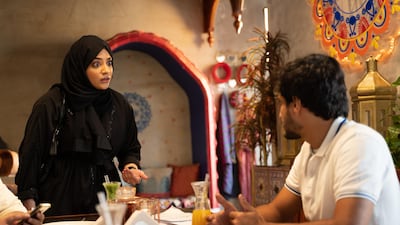The third season of Takki premiered on Netflix in October and marks the return of the series after a six-year hiatus.
The Saudi show debuted on YouTube in 2012, and was famous for boldly portraying the kingdom’s youth-related issues on screen.
It tells the story of Bayan, a video blogger and Twitter personality, who becomes embroiled in a vicious drama after sharing a car ride with a budding filmmaker named Malek. The chance meeting then spurs a series of misunderstandings and betrayals. The show brushed on themes from gender relations and domestic issues to drug use and racial tensions.
As the series makes its comeback, it reprises its story in a country that is markedly different than the one it left behind, but Takki creator and director Mohammad Makki says it still has its finger on the Jeddawi pulse.
“Just how Jeddah evolved, Takki evolved with it,” Makki tells The National. “The opening of the cinemas, women driving, the changes that happened in reality are paralleled in the show. Jeddah is beautiful, and we wanted to show that.”

When Makki began the series, he meant it as a reflection of his experiences as an aspiring filmmaker in Jeddah.
Filmmaking in a Saudi Arabia that predated film festivals and cinemas was often seen as a starry-eyed pursuit, Makki says, which often instilled feelings of doubt and uncertainty.
“I was living between friends and people, hearing their stories, their dreams and ambitions,” he says. “I thought it could be great cinematic work, but there were no cinemas.”
Undeterred, Makki still sought to find a way to present the stories around him on screen, especially since there weren’t any works catering to Saudi youths, taking on universal themes of friendship, love and betrayal in Jeddah.

“We decided to do a series instead,” he says.
However, the country’s broadcasters showed little interest in screening the series Makki had in mind.
Saudi drama, at the time, almost exclusively revolved around the histrionic struggles of elite families, and television executives found Takki’s youth-driven plot too out of the ordinary to commit to.
So the director decided to take the show online.
“YouTube was becoming increasingly popular so it made sense to put Takki there. We filmed the first episode and put it up on YouTube. It was a test run. If it didn’t work, we would all go back to doing what we were doing.”
But Takki, which is Saudi slang for “relax”, was a sensational success. The relatability of its characters and the outward-spiralling storyline made it popular with Saudi Arabia's YouTube users. The first season raked in more than 20 million views and helped to land the show a television deal. Its second season premiered in July 2015 on Al Araby television network before also becoming available on YouTube.
Last year, Takki was picked up by Netflix, a move that ballooned the show’s reach. Knowing he was now presenting for a global audience, Makki says he did feel the pressure dial up as he prepared for season three. Yet, he and the other writers were keen on retaining the qualities that made Takki popular among local audiences.

“As writers, we try to be honest with ourselves, find what’s interesting to us, what makes us laugh,” Makki says. “Our focus is to make Takki a show about Jeddah but with universal themes like friendship, love and betrayal.”
It is those universal themes that will make the show resonate on a regional and global level, he says.
“Who doesn’t know the feeling of jealousy or the need to realise your dream?”
A reprisal of roles
The show’s cast members say they were nervous and excited about Takki’s unprecedented reach as they were preparing for the new season, but more importantly, they were keen on reprising the characters “as the local audience remembered them”.
Khairia Abu Laban, who plays protagonist Bayan, says fans will find her character to be the same “ambitious person that many women in Saudi Arabia could relate to, but at the same time, she’s more mature in the way she overcomes her obstacles. She’s more self-assertive.”
Abu Laban says the character was still within her after all these years.
“I know Bayan, I understand her,” she says. “We’ve also been with these characters for a decade. It’s why we’re given the freedom to do what we feel is right for our characters.”
Actor Moayed Althagafi says he was keen to return to the role of Malek. The character, being a budding director, is a reflection of Saudi Arabia’s film industry. “There were no cinemas when Malek was dreaming of becoming a filmmaker, but now there is.
“It was definitely a challenge returning to Malek after nearly seven years. But I wanted to show how he’s grown over the years. That he’s had experiences that shaped him just as we did.”
Althagafi says it’s still somewhat of a dream “how this simple project on YouTube managed to get on Netflix” but that the cast and crew did their utmost to deliver the best season they could, despite the production challenges brought on by the pandemic.
“We definitely felt more responsibility,” he says. “I mean, we’re showing in 190 countries. There have been a lot of developments to the story, the production level, the script, the characters. It’s the same heartfelt drama that many love, but more developed.”


